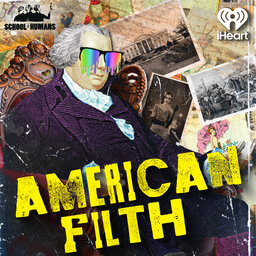Puritans Cancel Christmas (Rerun!)
Let's remember the filth behind what makes the yuletide so gay. Back with new episodes next week!
In 1 playlist(s)
American Filth
From famous founders to capitalist cooks, from sex scandals to the dirtiest blues song, AMERICAN FIL…Social links
Follow podcast
Recent clips

American Filth Bids You A Filthy Farewell! But Don't Worry...
11:38

GAY OR NAY: Was J. Edgar Hoover A Cross-Dressing Queen?
26:41

"The Stripper and the Congressman" (They Boinked)
27:20
 American Filth
American Filth